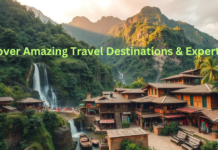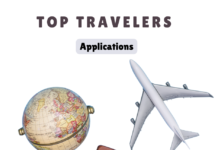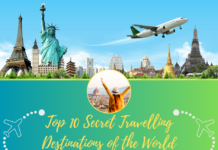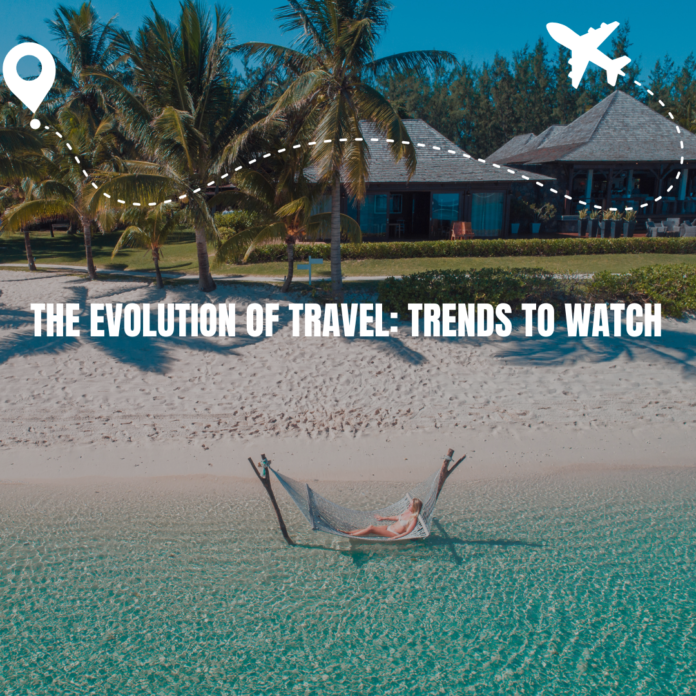Introduction
Traveling has always been included in human life; therefore, it may mean tourism, adventure, and people from one culture meeting others. Over the years, the travel industry has undergone crucial transformations influenced by technological improvements, changes in customer preferences, and events that have taken place globally.
It is important in the modern world to grasp trends that shape the future of travel. This article takes a deep dive into the evolution of travel, from trends to watch like sustainable tourism and digital nomadism, the impact of artificial intelligence, and experiential travel.
The Changing Landscape of Travel
- Tourism for Sustainability
With focused awareness of the environment, travelers are conscious of options that would embrace sustainability. Travelers increasingly look out for eco-friendly accommodations, responsible wildlife tourism, and carbon offsetting initiatives.
Travelers would increasingly look out for activities that reduce their impact on the local environment and add value to the community. This would be reflected in the growing interest in ecotourism resorts, conservation programs, and volunteer tourism opportunities.
- Digital Nomadism
Home-based working has also given birth to a novel kind of traveler: the digital nomad. Using the power of laptops and Wi-Fi, scores are now taking advantage of location independence and hitting the roads while still in touch with their workplaces. Concumantly, this has stimulated the growth of shared workspaces where digital nomads can meet others of a similar disposition, make friends, and work together on projects.
So is the hotness of the trend with a flexible lifestyle and curiosity to explore new cultures.
- Experiential Tourism
It is not the place alone that modern-day travelers are in search of, but authenticity in experiences, whereby they connect themselves with the culture of the place. What is to be ensured in experiential tourism is immersion into what makes a destination unique, whether through culinary tours, cultural workshops, or adventure activities.
This characterizes a shift in trends from traditional sightseeing toward meaningful interaction; such interaction allows for the creation of long-lasting memories.
- Integration of Technologies
Technology is still playing a huge part in travel. From mobile applications that enhance your experience of traveling to AI-driven chatbots offering customer support, technology smoothens everything in the case of travel planning and the actual experience.
Now, virtual reality takes over, enabling tourists to pre-view their destinations before making any bookings. Changing technology means the ways we move around the world will continue to change.
- Healthy and Medical Tourism
Health and wellness have ceased to be solely about one’s exercises and diets, but play an important role in the decisions about vacations. The wellness retreats, yoga retreats, and spa vacations are fast catching up as people seek rejuvenation of the body and mind. Places that open their arms toward wellness prank special packages to entertain this niche and growing market with more holistic approaches toward health and fitness.
- Personalization and Customization
The modern voyager seeks personal experiences that would answer to his needs. The wide use of analytics and consumer insight makes travel companies tailor-make a lot of flights, activities, and suggest special deals. Personalization enhances the megatravel experience by making it more relevant and enjoyable to individuals. This is definitely setting the course for the future of marketing in travel, as it puts companies to task to understand their customers better.
- Increased Solo Traveling
Solo travel has been gaining momentum in the past years, with more people exploring the world. This is basically fuelled by motivations of self-discovery, independence, and even connecting with other people. Tourism companies try to address this by offering tours and experiences for solo travelers that enable them to be among their own kind.
- The Impact of Global Events
Global events, such as the COVID-19 pandemic, have reshaped the travel landscape in very deep dimensions. Health began to be juxtaposed with safety, and both travelled protocols and hygiene became vital. The pandemic accelerated the industry’s digital transformation rather quickly, as virtual experiences and contactless services have forcibly gone up. Lessons learned from such life during these global events will shape the future of travel as the world recovers.
20 Frequently Asked Questions (FAQs)
- What are some of the hot trends in travel for 2024?
Key trends include sustainable tourism, digital nomadism, experiential travel, health and wellness travel, and technological integration.
- How do travellers do sustainable tourism?
The tourists may stay in environmentally friendly hotels, eat at local company outlets, limit their litter and participate in the conservation of the natural features.
- What is digital nomadism?
Digital nomadism simply refers to the practice of working remotely, potentially from anywhere, while traveling, with the help of coworking spaces and other digital resources.
- Why Is Experiential Travel Becoming So Popular?
Experiential tourism allows tourists to be on par with the locals’ culture and thus creates memories rather than sightseeing.
- How does technology take part in the changes of the tourism business?
Technology makes it easier to plan trips, improves customer service, and introduces new innovations like virtual experiences into this world.
- What kind of wellness travel experiences can I have?
For instance, the most sought-after destinations for the worn-out individual include wellness retreats, yoga retreats, spa vacations, and tours that focus on fitness-oriented activities.
- How may travel firms make providing personalized experiences to customers possible?
In a nutshell, through data analytics and customer insight, companies can offer tailored itineraries and recommendations that resonate with individual preferences.
- Is it safe to travel alone?
Although solo traveling can be challenging in some respect, many destinations offer amiable environments for solo travelers, and safety precautions increase security.
- How has tourism fared due to the COVID-19 pandemic?
The pandemic brought in the introduction of heightened health and safety protocols, a shift toward digital solutions, and a new look at hygiene in travel.
- What is ecofriendly tourism, travel and recreation?
It means reducing plastic usage, using modes of transportation that are eco-friendly, supporting local conservation efforts, and minimizing waste.
- Which destinations are popular with digital nomads?
Places like Bali, Chiang Mai, Lisbon, and Medellín have popped out as hubs for digital nomads, boasting great coworking space and really active communities.
- How do tourists go about volunteering tourism?
Some tourism programs offer the opportunity for tourists to volunteer programs that assist in community development, wildlife conservation, or environmental projects.
- What does health and wellness travel have to offer?
Wellness tourism is about health combined with travel, invigorating the traveler with the much-needed rejuvenation in tranquil environments.
- How does technology manage to enhance the in-flight experience?
It makes travel quite easier because of modern mobile applications, AI chatbots, virtual tours, and personalized recommendations.
- Which destinations are the most sought after by solo tourists?
Places like Iceland, Japan, Portugal, and New Zealand are considered the top destinations for solo travelers because of their safety and friendly attitudes.
- How do travelers ensure that they are safe while traveling?
Safety can be ensured through researching of destinations, being aware, communicating, and following health guidelines.
- Also included in the paper is the use of social media for travel.
It shapes travel decisions in the way experiences are shared, new destinations are learned about, and contacts are made with other travelers.
- How can tourists contribute to local economies? These tourism activities involve making purchases at local markets, eating at locally owned restaurants, and participating in community-based tourism activities.
19. As far as what new up-and-coming technologies are in travel? Emerging technologies include AI chatbots, augmented reality, blockchain for secure transactions, and enhanced data analytics to help create personalized experiences.
20. How will travel change in the future? The journey ahead will be shaped by sustainability, technological change, and changing consumer preferences that will continue to evolve and shape the industry of tomorrow.Conclusion This change in the way people travel has bespoke humanity’s determined spirit-to explore, survive, and adapt to any situation in life.
The emerging travel trends will reflect the evolution of values and desires transitioning into new frontiers, as also the evolution of technological capabilities. Ranging from sustainable tourism and digital nomadism to experiential travel and personalized experiences, the travel space is extremely dynamic and constantly evolving.
Through embracing such trends, travelers can take journeys that are memorable yet meaningful, connecting with the world and its cultures. Let us be open to the possibilities of this new era in travel, charting our path toward a more rewarding and sustainable travel experience.








































